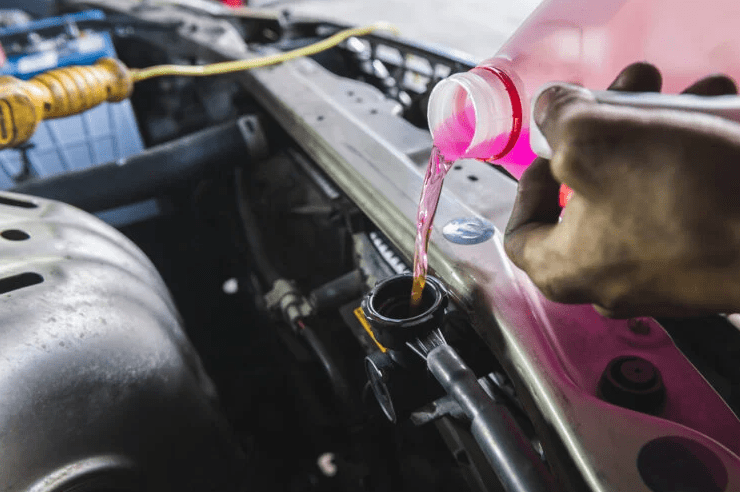Living in the UAE means driving on smooth highways, going on long road trips, and facing strong heat, especially in summer. But did you...
Importance of engine coolants
Engine coolants are essential for the efficient operation of engines. They help to reduce the temperature of the engine, which in turn helps to prevent damage and degradation.
Coolant systems typically contain three types of fluid: antifreeze, water, and oil. When these fluids mix, they create a protective layer that helps to keep engine parts from rusting and corrosion. This layer also prevents the formation of ice inside the engine.
If your engine is not using its correct coolant system, it may not work properly or at all. In some cases, this can cause damage to critical components such as the valves or pistons. If you notice any signs of trouble with your engine’s cooling system, contact a professional mechanic as soon as possible to fix the problem.
1. What is a coolant?
A coolant is a type of fluid that’s used to keep engine parts cool. It helps to reduce the risk of engine overheating and corrosion, and it also helps to prevent the build-up of sludge in the engine.
There are many types of coolants available on the market, and it’s important to choose the one that’s specifically tailored for your vehicle. Some common types of coolants include water, ethylene glycol, propylene glycol, and methylene chloride.
It’s essential to replace your cooling system every 5 years or when you detect any signs of wear or damage. By doing this, you’ll ensure that your engine remains in top condition and performs as expected.
2. Why does your engine need it?
Engine coolants are essential to the operation of your car engine. They’re used to reduce the temperature of the engine’s cylinders, which helps to ensure that it runs smoothly and consistently.
Over time, engine coolants can become contaminated with debris or oil. This can result in reduced performance and increased wear and tear on your engine. In some cases, it can even lead to permanent damage.
It’s important to keep your engine coolant level consistent and free from contaminants so that it can operate at its best. If you notice any abnormalities with your engine, such as decreased performance or excessive noise, it’s important to get it checked out as soon as possible by a professional mechanic.
3. Which coolant should you use?
There are a number of different coolants available on the market, and it’s important to choose the right one for your engine.
The most common coolants used in engines are water, ethylene glycol, and propylene glycol. Water is the cheapest and easiest to use, while ethylene glycol and propylene glycol are more expensive but offer better performance.
When choosing a coolant, you should also take into account the following factors:
– Your engine’s type
– The climate where you live
– The altitude at which you live
– The weight of your vehicle
4. When do you check your coolant level?
It’s important to check your engine coolant level on a regular basis to ensure that it’s at the right level and doesn’t need replacing. Engine coolants are essential in keeping your engine running at its best and preventing it from overheating.
Coolant is a liquid that’s used to keep an engine warm and functioning. It circulates through the engine and absorbs heat, preventing it from overheating. You can check your engine coolant level by following these steps:
1. Park the car in a safe location and turn off the ignition
2. Open the hood of your vehicle and remove the bonnet (hood)
3. Place a container beneath the radiator hose and fill it halfway with coolant (make sure you use the correct type of coolant for your car)
4. Replace the radiator hose by reversing its direction
5. How to check and add coolant to your car?
Engine coolants are essential for keeping your car’s engine running at its best. They help to reduce the risk of overheating and keep the internal combustion engine running at its most efficient level.
There are a number of different types of engine coolants on the market, each with its own benefits and drawbacks. It’s important to choose the right one for your car, based on the type of engine it has and the conditions in which you’ll be driving it.
To check if your car needs coolant, remove the cap from the reservoir and fill it up to the recommended level with fresh cold water. If the level is below the “MAX” line, then your car needs more coolant; if it’s above that line, then your car doesn’t need as much. Add enough coolant to bring the level up to Max, and replace the cap on top of the reservoir.
It’s essential to keep your car’s engine cool by adding fresh coolant whenever necessary — even if you don’t notice any signs of overheating. Doing so will help to prevent damage to your engine, as well as ensure that it runs at its best performance.
If you get no time for your car servicing and maintenance, worry not we will help you. For hassle-free car maintenance, cleaning, and servicing, you can book our service including car pick and drop-off. Call us or WhatsApp @ 0507979225 or email at info@carregistration.ae



